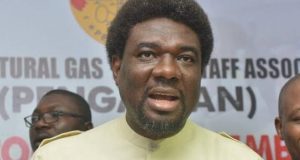The Organised Labour has faulted the over N3 trillion bailout granted to generation and distribution companies in the power sector by Federal Government after they have been privatised.
The National Union of Electricity Employees especially criticised the government for injecting funds into companies owned by individuals without a commensurate increase in electricity generation and supply in the last 10 years.
The Secretary-General of the NUEE, Joe Ajaero, made the criticism in Abuja on Thursday at the public hearing organised by the House of Representatives Committee on Power, on a bill to seeking amend the Electric Power Sector Reform Act, 2005.
The Chairman of the committee, Aliyu Magaji, had in his opening address, noted that the public hearing was to address some concerns expressed by the Nigerian Governors’ Forum.
In his presentation, Ajaero pointed out that the privatisation in the power sector had further compounded the economic woes, stressing that policy was designed to fail from the onset.
“There has not been meaningful improvement or contribution by the current investors nine years after privatisation, and 17 years after the Electric Power Sector Reform Act, 2005, was signed into law,” he stated.
Ajaero called for a total review of the privatisation exercise, asking, “This Act, are we really obeying it?”
He stated, “As we speak now, almost N3tn has been pumped into the power sector, which wasn’t there when it was owned by the government, what is the logic to say the government has no business in business, and the government now has to pump and fund the business of another man. We need to sit down and see what is working for us.”
Ajaero made reference to the recent back-door upward review of electricity tariff, saying, “If the government is pumping in trillions and Nigerians are being compelled to pay, you can see what is happening; the country is suffering.”
The NUEE leader added, “If you put N2tn in the economy of Nigeria today, it will thrive. But it is being pumped into businesses owned by individuals. Let us look at. What is the cost-benefit analysis of this if we have to take our money…and go and check the records for about 10 years before privatisation, the government didn’t put 10 per cent of that money into the sector but it is putting it now. For another 10 years, no increase in generation, no conscious master plan; there is no plan in the country that by next year, power plants will come into the system; none for the next two or three years for power generation to be constant at 4,000megawatt, and demand will continue to increase because more houses will be built, connect on and on.”
Ajaero decried that the matter was reduced to being discussed at a public hearing “and no action is taken further on how to make the system work.”
According to him, Nigeria is still at the bottom of countries suffering “power poverty” all over the world.
He noted, “The normal concept is one million people to one thousand megawatt, and we have a country of 200 million people with 4000 to 5000megawatt. Nobody is talking about it.”
Ajaero recalled that under the military regime led by General Ibrahim Babangida retd, there was a feasibility study on Mambilla power plant “which had the capability of giving what we are having in this country today, and from that period till now nothing has happened. The same thing with Zungeru (power plant).”
Meanwhile, the Minister of State for Power, Goddy Jedy-Agba, declined to explain the recent backdoor increment of electricity tariff, stating that only the NERC can explain the hike.
Jedy-Agba, who was also at the hearing, was approached by journalists after the event to explain the indiscriminate tariff hike.
The minister said, “Where is the chairman, NERC? He is the one that does anything on tariff. I can’t speak on tariff. He is the chairman of NERC that can speak on tariff.”
When reminded that his office supervises the NERC, Jedy-Agba said, “No, no, no! Don’t put me in a corner. There is a chairman responsible for NERC. You want me to tell you what does not apply and you hold me on to that responsibility? The chairman of NERC is here. Let me bring him here. So, when you ask me, he will answer it. It is the chairman (of) NERC that is responsible for tariff increase.”
However, when one of the minister’s aides sent to call the NERC chairman approached him, he declined to approach the minister and left the venue hurriedly.
 Financial Energy Review
Financial Energy Review





